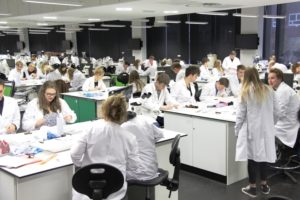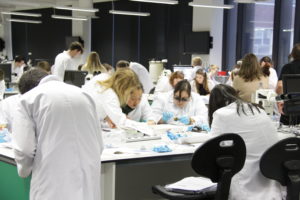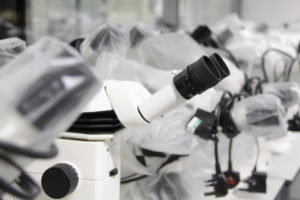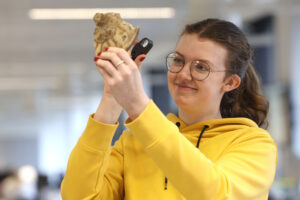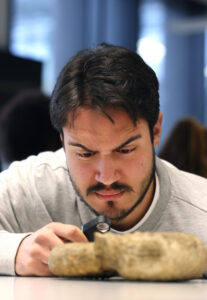How you'll learn
The programme employs a blended approach that combines lectures, practical workshops, tutorials, group projects, fieldwork, and independent study. Fieldwork is an integral component, particularly in the Geoenergy pathway, where students engage in hands-on data collection, analysis, and problem-solving in real-world settings. This experiential learning approach enhances practical skills, contextual understanding, and employability. This wide range of teaching methods using both in-person and online resources reflects the diversity of the student population and their learning styles, and is designed to be inclusive. This includes a combination of synchronous and asynchronous lectures, collaborative projects that encourage teamwork and knowledge exchange, and practical workshops that cater to different learning styles.
Teaching methods and module syllabuses are designed to facilitate authentic assessment, a key component of our programme, aligning with real-world applications and industry practices, frequently using real-world case studies. These are drawn from diverse international contexts, highlighting where geoscience challenges and solutions vary, or do not vary, across different economic and geographical contexts.
How you're assessed
We employ several innovative assessment techniques, including independent research projects that simulate real-world research and industry scenarios, group projects that reflect professional teamwork, and fieldwork assessments that provide hands-on experience and reinforce theoretical knowledge through practical application.
To accommodate our diverse student body, we offer a variety of assessment formats, including coding assignments, data analysis reports, group projects, oral presentations, and practical demonstrations. This variety ensures that all students can showcase their competencies effectively and are not only academically accomplished but equipped with the practical skills and experience necessary to excel in their professional careers.
Research components are integrated progressively into assessment throughout the programme to build and assess students’ critical understanding of enquiry. This culminates in a substantial independent research project, which acts as a capstone assessment where students can draw on a wide range of elements from the modules they have taken. This project requires students to manage a complex, real-world problem from conception to completion, mirroring professional practice and thus serving as a key research-connected authentic assessment.
Liverpool Hallmarks
We have a distinctive approach to education, the Liverpool Curriculum Framework, which focuses on research-connected teaching, active learning, and authentic assessment to ensure our students graduate as digitally fluent and confident global citizens.
The Liverpool Curriculum framework sets out our distinctive approach to education. Our teaching staff support our students to develop academic knowledge, skills, and understanding alongside our graduate attributes:
- Digital fluency
- Confidence
- Global citizenship
Our curriculum is characterised by the three Liverpool Hallmarks:
- Research-connected teaching
- Active learning
- Authentic assessment
All this is underpinned by our core value of inclusivity and commitment to providing a curriculum that is accessible to all students.
